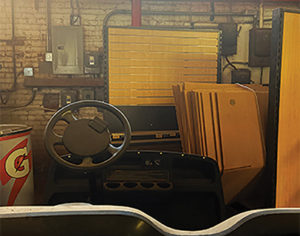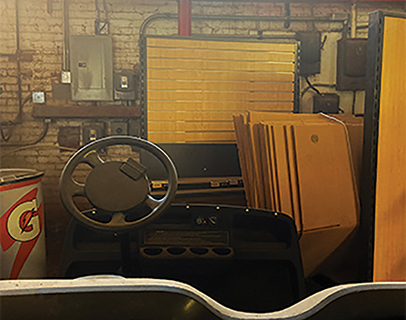by Kevin Ford, Assistant Editor

The morning rises fast as students yawn on their way to 8 a.m. classes. Claire Theis walks to her classes each morning, although her walks do not go without detecting the sight of littered trash on campus.
Theis, a senior pre-med biology major at Northwestern, said people litter all over campus. Theis helps the campus stay clean, though she finds it hard to raise awareness from students.
“People lose interest over time,” she said.
Theis attended the fall club fair on campus to raise awareness about trash and recycling. The low turnout of students at the club fair did not help the cause, she said.
How can Northwestern implement a recycling program on campus to reduce waste?
Almost a decade ago, a campus recycling program was enacted on the Alva campus. Dr. Steven Mackie, professor of education at Northwestern, used to teach on the Alva campus back in 2011 before he moved his office to Enid. Mackie said students ran the recycling program on campus.
“Recycling is not as profitable, but good for the long-term,” Mackie said.
The students used to collect material in a cattle trailer, he said. It became expensive and intense. The primary focus was on aluminum; however, with the consumption of plastic increasing throughout the last 10 years, therefore the focus shifted toward gathering plastic waste items instead of aluminum.
The program on the Alva campus did not last because the student volunteers needed more help from administration to help fund the shipping and handling of the waste gathered, Mackie said.
Today, Mackie helps guide students of CORE, a student-led organization with the goal to “Conserve Our Ranger Environment.”
He has been a part of CORE since it was founded in 2009. CORE runs the recycling on campus in Enid. The program has been able to manage the waste gathered by students and faculty, he said.
“Back in February, CORE approached Dr. Bo Hannaford about getting a recycling program going in Alva again,” Mackie said. “But then COVID hit, and the idea kind of died on the vine.”
The biggest obstacle facing the Alva campus is the question of where to take all of the collected waste. Dr. David Pecha, vice president for administration, acknowledged CORE’s efforts to run a recycling program.
“The problem in Alva is that there is nowhere to take the recyclables,” Pecha said.
The Alva campus does collect cardboard boxes, Pecha said. The maintenance shed on campus is where the cardboard boxes get stored. The material only gets shipped out a couple times each semester, he said.
“If we tried to recycle newspapers or tried to recycle cans, where would student groups or employees be able to take it?” Pecha said. “I think there would be interest for both employees and students if there was some way to recycle items.”
Waste management is hard in Alva, Mackie said. For a recycling program to come to fruition on the Alva campus, the area of waste management might require help from administration and “the higher ups” in Alva, Mackie said.
But how might an on-campus cleaning and restoring program operate accordingly? What criteria needs to be met to successfully maintain a campus waste and recycling program in Alva?
LARGER UNIVERSITIES
The University of Colorado at Boulder runs a recycling program. The university works in collaboration with the partnership of stakeholders on its campus, as well as the City of Boulder for necessary infrastructure.
University officials said the most crucial parts of their program are partnerships with stakeholders on campus. Some of these departments include the facilities management, the environmental center and the green labs.
The program began in the mid-1970s with students getting funding from student government, officials said.
As the program grew, the partnerships between stakeholders grew and solidified, officials said.
The University of Georgia office of sustainability conducted a study in spring 2019 to measure the impact of placing special signage above centralized trash and recycling bins.
Three different types of messaging were tested on bins in three different academic buildings.
Each sign was to either inform students or motivate them and do a product transformation.
The results showed that, regardless of the message, on average, the three sign messages decreased contamination in recycling by 13.83 % and reduced the amount of recyclable items in the landfill bins by 18.31%.
Photographs with simple words are recommended as the strongest options to guide sorting behavior, the university’s office of sustainability said.
Waste audits, consulting and case studies are a part of Michelle Dunn’s college-hopping duties. Dunn, a business development manager and an expert for Busch Systems, said the universities are typically at the forefront of community recycling.
University towns tend to gravitate to a well-led student body on campus, and the impact spreads to the rest of the community. This has also proven to improve the local economy, according to Busch Systems, because of the reduction in overall waste.
Most recycling programs that have been developed on campus grounds have ultimately rubbed off and created strong stewardship with the surrounding community and people, Dunn said.
POSSIBLE BENEFITS
Alva is already a strong community, according to Luis Mendoza III. The ties between community members and students grow stronger each day, he said. Mendoza III, admissions counselor with the recruitment office, liked the idea of incorporating a student recycling program on campus.
“We could create a social media page where we show students walking around campus collecting plastic,” Mendoza said, “and feature students who choose to participate on the social media page.
“Placing blue bins around the buildings and hallways gives the university a clean look and would also help attract new students onto Northwestern campus.”
Recycling is only one piece of the sustainability puzzle, Mackie said. The ultimate goal is to reduce consumption.
Waste reduction can be a huge benefit for the local economy, as much as it could impact the health of the community, according to Busch Systems.
Families are more willing to go out into the parks and recreational complexes if they consistently stayed clean.
The idea of recycling does not only display good community health, but also creates a positive image for the school in general, Mendoza said. Showcasing great leadership and civil duty are fundamental ways in building a sustainable community, he added.
During the first couple of weeks of school, some students have pointed out large amounts of trash and have voiced their opinions about it. Chris Ortiz, a junior health and sports science major from Jay, said students on campus tend to litter on the lawn near Coronado Hall.
“I see the janitors and the custodians busting their tails, picking up the trash that students left playing volleyball on the lawn,” Ortiz said. “I wish people were a little more respectful and just picked up their trash.”
A Ranger recycling program would be a great opportunity for students to educate themselves and network with the surrounding community, Mendoza said.
It would certainly be a promising site for everyone on campus to see less trash in general, Ortiz said. In addition, maybe even a surplus of bins around campus, giving people the chance to make a difference, he added.

